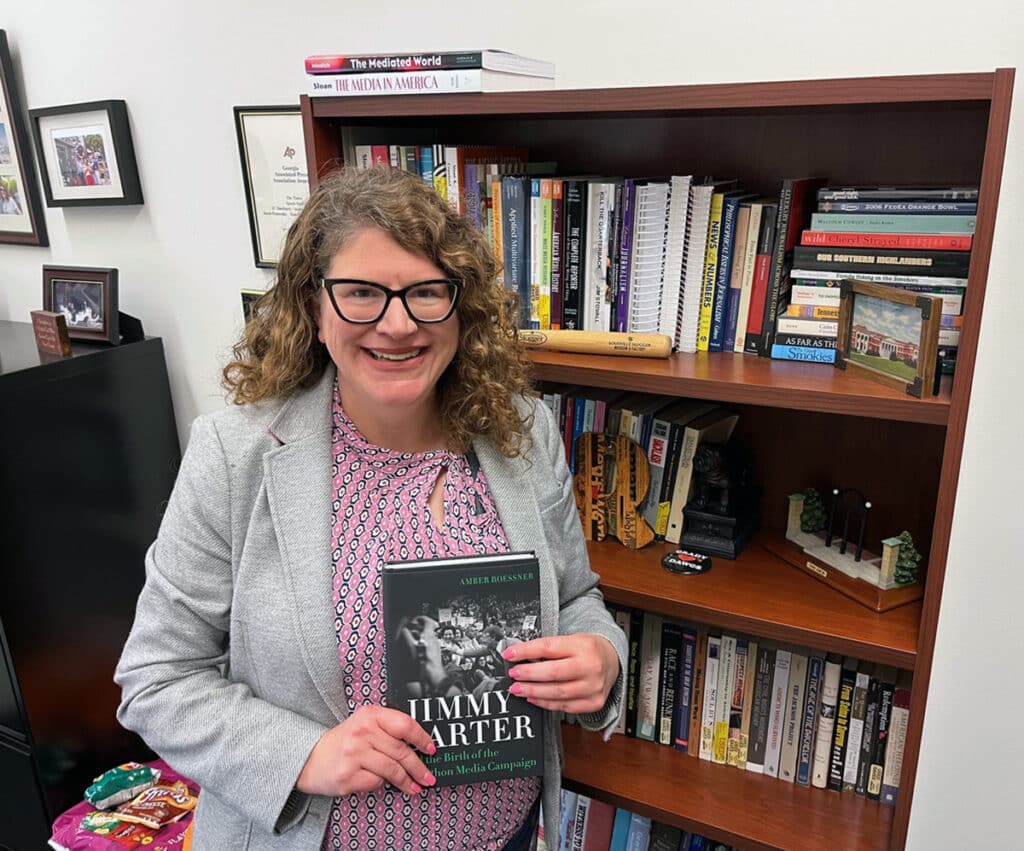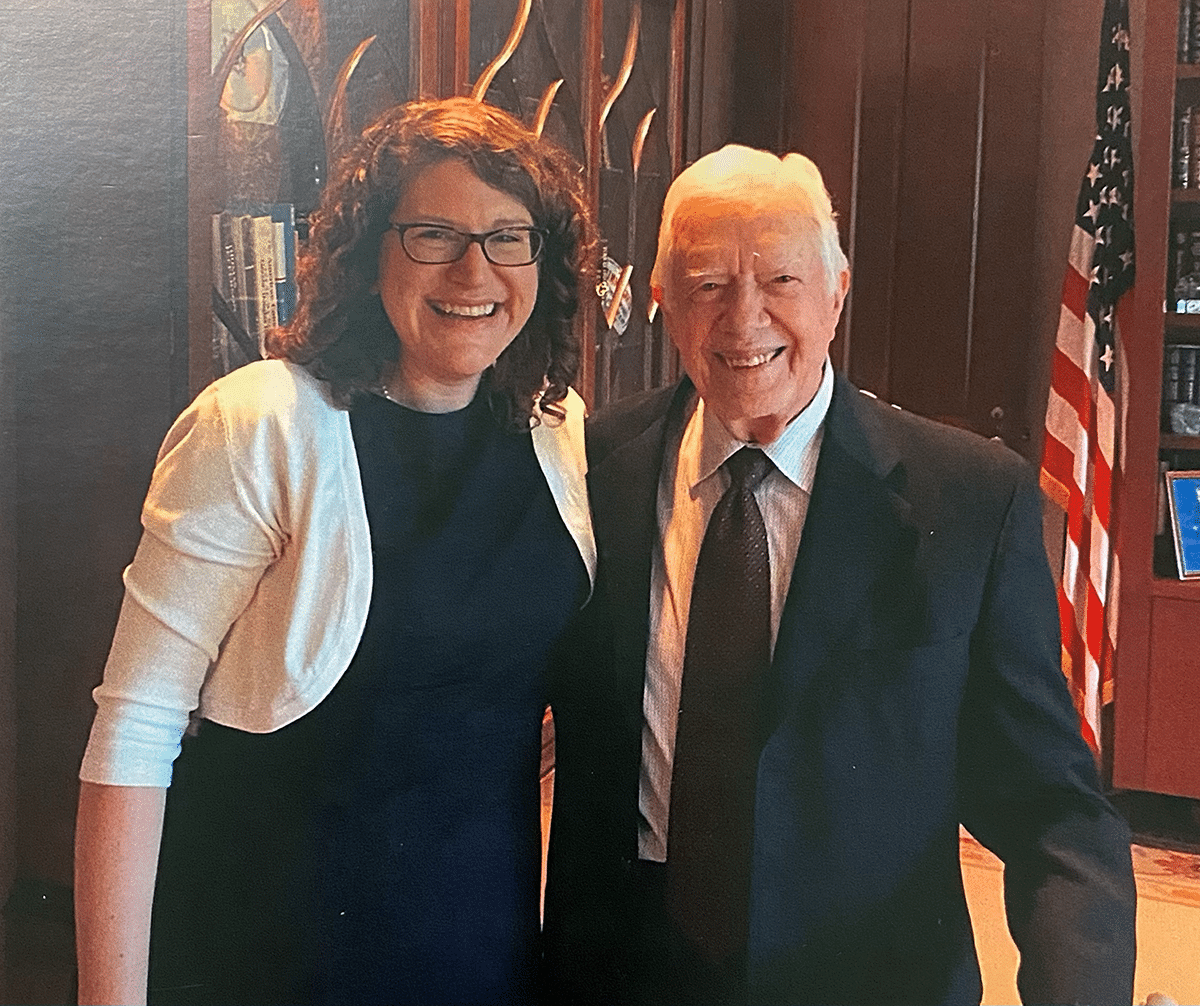When School of Journalism and Media Professor Amber Roessner decided to shift her research subject matter from the history of sports media to presidential politics, it puzzled some family and colleagues.
Their befuddlement grew when the former sportswriter and magazine editor-turned-academic shared that her focus would be on the presidential campaign of former President Jimmy Carter. Roessner said some of her colleagues—and later even Carter himself—pointed out much had already been published about the 39th US president.
Nonetheless, Roessner was convinced she could offer a new perspective in what on the surface seemed an exhausted area of scholarship.
“I do think that I was able to offer a deeper insight into the ways that he and his advisors embraced image craft and also the ways in which his relationship with reporters impacted his coverage,” Roessner said, “and a new understanding of his ‘miracle’ presidential campaign and little-heralded presidency.”
Many agreed.
Roessner is now a leading expert on Carter. She’s the author of Jimmy Carter and the Birth of the Marathon Media Campaign, which examines the peanut farmer’s rise to the presidency and his campaign’s impact on American politics and journalism, and she’s working on a forthcoming book about his presidency and post-presidency.
In addition to her research on Carter, Roessner teaches and studies media history and its relationship to cultural phenomena and practices, including the operation of politics; the negotiation of public images and collective memories; and the construction of race, gender, and class. She also is the editor of American Journalism: A Journal of Media History, the flagship publication of the American Journalism Historians Association.
Her expertise on Carter has led to numerous media professionals seeking comment on the president’s legacy throughout the years. Most recently, requests have been to provide context on the longest-lived president’s legacy after he died on Dec. 29, 2024. He was 100.
When she first began working on her book about Carter, Roessner never imagined that years later media professionals would view her as a leading expert and trusted authority on the former president.
“I have tried to answer all of the requests for talks and media queries because I see it as my duty as someone who has studied the life and legacy of Carter so closely for more than a decade to offer context and perspective,” Roessner said. “It’s an honor to share my insights into Carter’s life and his legacy with those in this community and all around the globe.”
The string of interview requests has also given Roessner a chance to pause and reflect on her own personal experiences with Carter.

Learning about Carter
While some were skeptical about her decision to shift from researching sports media history to offering historical context on Carter’s presidential campaign and its impact on American politics and journalism, Roessner felt it was a natural shift.
“Most of my work focuses on the same phenomena, image craft—the negotiation of image at the intersection of journalism, public relations, and advertising, and the evolution of collective or public memory,” Roessner said. “When I began my doctoral work at the University of Georgia in Athens, I was interested in image craft surrounding early 20th century baseball heroes and late modern US presidents Carter and Ronald Reagan.”
Tackling early image craft around the national pastime was completed over the course of several years, culminating with the publishing of her first book—Inventing Baseball Heroes: Ty Cobb, Christy Mathewson, and the Sporting Press in America.
But her scholarship surrounding Carter’s life took more than a decade of analyzing more than 25,000 media texts, archival documents, oral histories, and long-form interviews—including an in-depth interview with Carter himself in 2014.
Growing up in Georgia in the 1980s, Roessner often heard Carter’s name and “failed presidency” come up together again and again, despite him being recognized later for his philanthropic work post-presidency.
This piqued her interest, and she revisited his campaign and presidency to better understand what seemed like a misunderstood public figure and an unheralded presidency.
One thing that quickly stood out to her about Carter was that he was hailed as somewhat of a media genius during and immediately after his 1976 presidential campaign. She added that he rose from relative obscurity to the White House.
“Carter had engaged in what some scholars call a politics of authenticity in 1976, promising moral reform and a government as good as the American people,” Roessner said.
However, she added that his image as a ‘miracle man’ struggled to withstand saturation news coverage.
Meeting the president
A highlight of her years-long research into Carter’s legacy was meeting him. She reached out three times before eventually getting an interview.
“He was doing fewer interviews by that time, and he only wanted to go on record about subjects that he had never been on the record about before,” Roessner said. “That said, once I had made my way through hundreds of boxes of archival materials, had the endorsement of his former communications director Gerald Rafshoon, and sent him a copy of my first book with a brief note about giving a kid from rural Georgia a chance, he kindly said yes.”
Roessner is unsure what Carter saw in her and her work that made him agree to be interviewed for her book, but she was deeply honored he did. She said it probably didn’t hurt that he was also an avid baseball fan, adding he very kindly praised her first book during the interview.
She can still vividly remember walking through his office door and coming face to face with the piercing blue eyes other journalists remarked on during his campaign and presidency. Roessner said he was very welcoming and accommodating and shared some important perspectives for the book.
“He was quite generous with his time and helped put me at ease by telling me he enjoyed my book and noting his time in my hometown of Winder, Georgia,” Roessner said.
Remembering his legacy
Roessner thinks Carter’s life really offers an instructive example to everyone. She said learning about his life and interacting with him and the people who knew him well taught her to be her authentic self with her students and everyone around her.
She added his legacy is also one of encouraging everyone to find ways to give back to their communities in any way that they can. She hopes people don’t just remember the journalistic and initial historical shorthand around him that portrayed him as a weak president but a noble post-president.
“I hope that they remember him on his own terms as he hoped to be remembered—as a good father and a champion for peace and human rights. I hope that they remember him as a model of public service and a man of great faith, character, and integrity, who helped our nation through a deeply troubled moment in the seventies and offered a model for what successful presidencies and post-presidencies might look like,” Roessner said.

